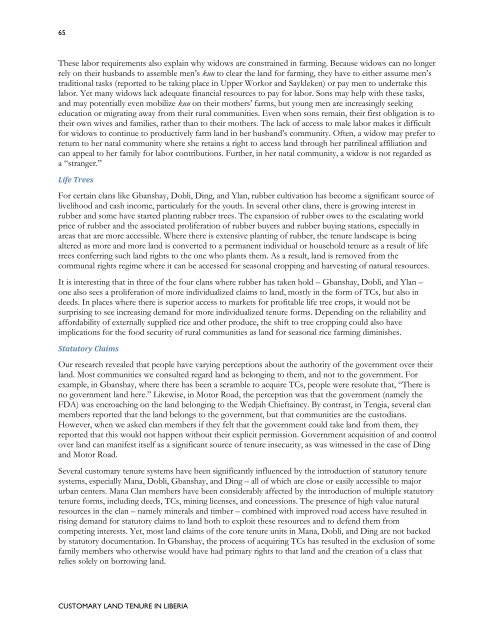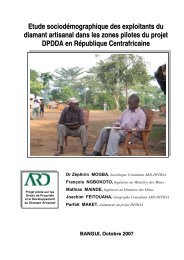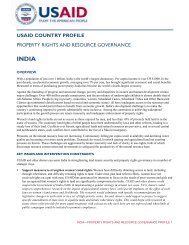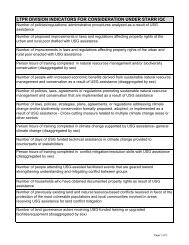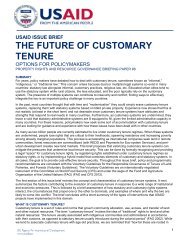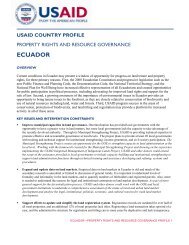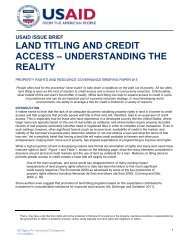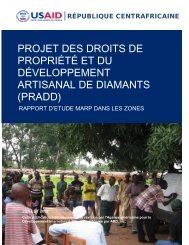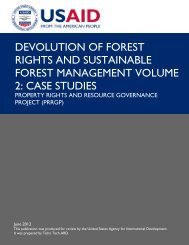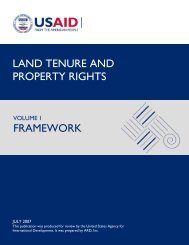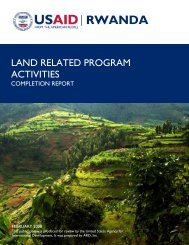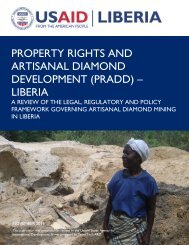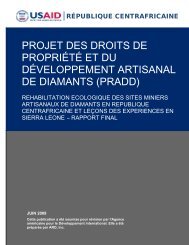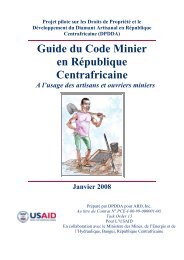Customary Land Tenure in Liberia - Land Tenure and Property ...
Customary Land Tenure in Liberia - Land Tenure and Property ...
Customary Land Tenure in Liberia - Land Tenure and Property ...
You also want an ePaper? Increase the reach of your titles
YUMPU automatically turns print PDFs into web optimized ePapers that Google loves.
65<br />
These labor requirements also expla<strong>in</strong> why widows are constra<strong>in</strong>ed <strong>in</strong> farm<strong>in</strong>g. Because widows can no longer<br />
rely on their husb<strong>and</strong>s to assemble men‟s kuu to clear the l<strong>and</strong> for farm<strong>in</strong>g, they have to either assume men‟s<br />
traditional tasks (reported to be tak<strong>in</strong>g place <strong>in</strong> Upper Workor <strong>and</strong> Saykleken) or pay men to undertake this<br />
labor. Yet many widows lack adequate f<strong>in</strong>ancial resources to pay for labor. Sons may help with these tasks,<br />
<strong>and</strong> may potentially even mobilize kuu on their mothers‟ farms, but young men are <strong>in</strong>creas<strong>in</strong>gly seek<strong>in</strong>g<br />
education or migrat<strong>in</strong>g away from their rural communities. Even when sons rema<strong>in</strong>, their first obligation is to<br />
their own wives <strong>and</strong> families, rather than to their mothers. The lack of access to male labor makes it difficult<br />
for widows to cont<strong>in</strong>ue to productively farm l<strong>and</strong> <strong>in</strong> her husb<strong>and</strong>‟s community. Often, a widow may prefer to<br />
return to her natal community where she reta<strong>in</strong>s a right to access l<strong>and</strong> through her patril<strong>in</strong>eal affiliation <strong>and</strong><br />
can appeal to her family for labor contributions. Further, <strong>in</strong> her natal community, a widow is not regarded as<br />
a “stranger.”<br />
Life Trees<br />
For certa<strong>in</strong> clans like Gbanshay, Dobli, D<strong>in</strong>g, <strong>and</strong> Ylan, rubber cultivation has become a significant source of<br />
livelihood <strong>and</strong> cash <strong>in</strong>come, particularly for the youth. In several other clans, there is grow<strong>in</strong>g <strong>in</strong>terest <strong>in</strong><br />
rubber <strong>and</strong> some have started plant<strong>in</strong>g rubber trees. The expansion of rubber owes to the escalat<strong>in</strong>g world<br />
price of rubber <strong>and</strong> the associated proliferation of rubber buyers <strong>and</strong> rubber buy<strong>in</strong>g stations, especially <strong>in</strong><br />
areas that are more accessible. Where there is extensive plant<strong>in</strong>g of rubber, the tenure l<strong>and</strong>scape is be<strong>in</strong>g<br />
altered as more <strong>and</strong> more l<strong>and</strong> is converted to a permanent <strong>in</strong>dividual or household tenure as a result of life<br />
trees conferr<strong>in</strong>g such l<strong>and</strong> rights to the one who plants them. As a result, l<strong>and</strong> is removed from the<br />
communal rights regime where it can be accessed for seasonal cropp<strong>in</strong>g <strong>and</strong> harvest<strong>in</strong>g of natural resources.<br />
It is <strong>in</strong>terest<strong>in</strong>g that <strong>in</strong> three of the four clans where rubber has taken hold – Gbanshay, Dobli, <strong>and</strong> Ylan –<br />
one also sees a proliferation of more <strong>in</strong>dividualized claims to l<strong>and</strong>, mostly <strong>in</strong> the form of TCs, but also <strong>in</strong><br />
deeds. In places where there is superior access to markets for profitable life tree crops, it would not be<br />
surpris<strong>in</strong>g to see <strong>in</strong>creas<strong>in</strong>g dem<strong>and</strong> for more <strong>in</strong>dividualized tenure forms. Depend<strong>in</strong>g on the reliability <strong>and</strong><br />
affordability of externally supplied rice <strong>and</strong> other produce, the shift to tree cropp<strong>in</strong>g could also have<br />
implications for the food security of rural communities as l<strong>and</strong> for seasonal rice farm<strong>in</strong>g dim<strong>in</strong>ishes.<br />
Statutory Claims<br />
Our research revealed that people have vary<strong>in</strong>g perceptions about the authority of the government over their<br />
l<strong>and</strong>. Most communities we consulted regard l<strong>and</strong> as belong<strong>in</strong>g to them, <strong>and</strong> not to the government. For<br />
example, <strong>in</strong> Gbanshay, where there has been a scramble to acquire TCs, people were resolute that, “There is<br />
no government l<strong>and</strong> here.” Likewise, <strong>in</strong> Motor Road, the perception was that the government (namely the<br />
FDA) was encroach<strong>in</strong>g on the l<strong>and</strong> belong<strong>in</strong>g to the Wedjah Chiefta<strong>in</strong>cy. By contrast, <strong>in</strong> Tengia, several clan<br />
members reported that the l<strong>and</strong> belongs to the government, but that communities are the custodians.<br />
However, when we asked clan members if they felt that the government could take l<strong>and</strong> from them, they<br />
reported that this would not happen without their explicit permission. Government acquisition of <strong>and</strong> control<br />
over l<strong>and</strong> can manifest itself as a significant source of tenure <strong>in</strong>security, as was witnessed <strong>in</strong> the case of D<strong>in</strong>g<br />
<strong>and</strong> Motor Road.<br />
Several customary tenure systems have been significantly <strong>in</strong>fluenced by the <strong>in</strong>troduction of statutory tenure<br />
systems, especially Mana, Dobli, Gbanshay, <strong>and</strong> D<strong>in</strong>g – all of which are close or easily accessible to major<br />
urban centers. Mana Clan members have been considerably affected by the <strong>in</strong>troduction of multiple statutory<br />
tenure forms, <strong>in</strong>clud<strong>in</strong>g deeds, TCs, m<strong>in</strong><strong>in</strong>g licenses, <strong>and</strong> concessions. The presence of high value natural<br />
resources <strong>in</strong> the clan – namely m<strong>in</strong>erals <strong>and</strong> timber – comb<strong>in</strong>ed with improved road access have resulted <strong>in</strong><br />
ris<strong>in</strong>g dem<strong>and</strong> for statutory claims to l<strong>and</strong> both to exploit these resources <strong>and</strong> to defend them from<br />
compet<strong>in</strong>g <strong>in</strong>terests. Yet, most l<strong>and</strong> claims of the core tenure units <strong>in</strong> Mana, Dobli, <strong>and</strong> D<strong>in</strong>g are not backed<br />
by statutory documentation. In Gbanshay, the process of acquir<strong>in</strong>g TCs has resulted <strong>in</strong> the exclusion of some<br />
family members who otherwise would have had primary rights to that l<strong>and</strong> <strong>and</strong> the creation of a class that<br />
relies solely on borrow<strong>in</strong>g l<strong>and</strong>.<br />
CUSTOMARY LAND TENURE IN LIBERIA


